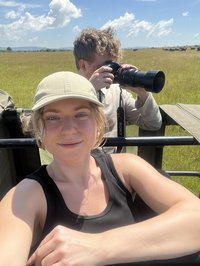2024: Livestock Impact on Large Mammals in the Maasai Mara Ecosystem

Msc. Student: Laura Ryge Koch
Program: Program: BSc., Department of Biology, Aarhus University
Supervisor: Professor Jens-Christian Svenning and Assistant Professor Robert Buitenwerf, Department of Biology, Ecoinformatic and Biodiversity, Aarhus University
Period: February – May 2024
The Maasai Mara is one of Africa's most diverse and spectacular ecosystems, providing a habitat for over 40% of Africa's large mammals. However, the increasing number of domesticated animals has led to overgrazing, resulting in significant consequences for large parts of the ecosystem. There is already a noticeable decline in large, wild animals and a significant degradation of land, especially in unprotected areas. If a solution to stop the loss of biodiversity and land degradation in the Maasai Mara is not found soon, it could be catastrophic for both the wildlife and the local population.
Mara North Conservancy's rotational grazing system is one of several progressive community-based initiatives established to protect the food source of wild herbivores and provide economic opportunities for thousands of people. Therefore, it is crucial to continue expanding our understanding of the impact of this initiative so that we can improve the system as quickly as possible, ensuring the survival of threatened wildlife species. We know that livestock grazing has strong effects on wild herbivore populations, but we still do not understand the dynamics causing this trend.
I aim to investigate and quantify the response of herbivores to the presence of livestock in Mara North's rotational grazing system using the vehicle-based strip-transect method. Comparing my work with previous results will help me answer whether the current rotational grazing system is a sustainable solution to maintain an appropriate grazing intensity.